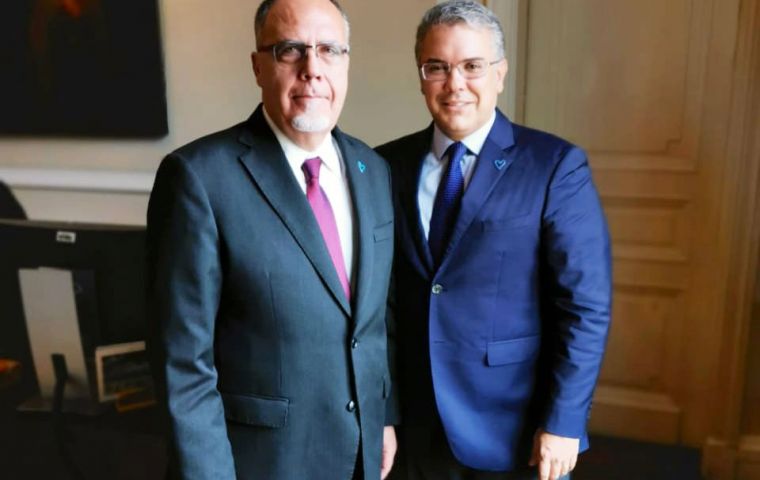MercoPress. South Atlantic News Agency
Illegal coca plantations in Colombia down slightly in 2018, but still the world's biggest producer
 Lapaque alongside Pte. Duque said government efforts, including eradication, substitution and the prosecution of drug traffickers, reversed the growth trend.
Lapaque alongside Pte. Duque said government efforts, including eradication, substitution and the prosecution of drug traffickers, reversed the growth trend. Illegal coca plantations in Colombia reduced slightly in 2018 but the country remains the world's biggest producer of the primary ingredient in cocaine production, the United Nations said on Friday.
The area of land used for cultivating coca leaf dropped from 171,000 hectares in 2017 to 169,000 in 2018, a fall of just 1.2 per cent, according to the UN Office on Drugs and Crime's representative in Colombia, Pierre Lapaque.
Although the crop reduction was small, it's a welcome reversal of a trend that saw plantations grow rapidly since 2013, when the area under cultivation was just 48,000 hectares.
By 2017, cocaine production had reached almost 1,400 tons, a record number.
Lapaque said government efforts, including eradication, substitution and the prosecution of drug traffickers, reversed the growth trend.
However despite last year's reduction Lapaque said, “Colombia is still at the highest cultivation levels” since the UN began measurements in 2001.
President Ivan Duque, who appeared alongside Lapaque at the presidential palace in Bogota, lauded the reversal of the “exponential growth trend” in drug plantations, which he blamed on his predecessor Juan Manuela Santos's anti-drug policies.
Duque has questioned the efficacy of Santos's strategy to manually destroy plantations while making crop substitution agreements with peasants working in the illegal industry, both part of the historic 2016 peace pact with Marxist FARC rebels to end their half-century of armed conflict.
Duque has petitioned Colombia's constitutional court in an effort to overturn a ban on the aerial spraying of the herbicide glyphosate to tackle the coca crops.
In October 2015, Colombia became the last country in the world to outlaw aerial spraying of glyphosate, a controversial substance that some believe to be carcinogenic and which pollutes groundwater and the environment.




Top Comments
Disclaimer & comment rulesCommenting for this story is now closed.
If you have a Facebook account, become a fan and comment on our Facebook Page!